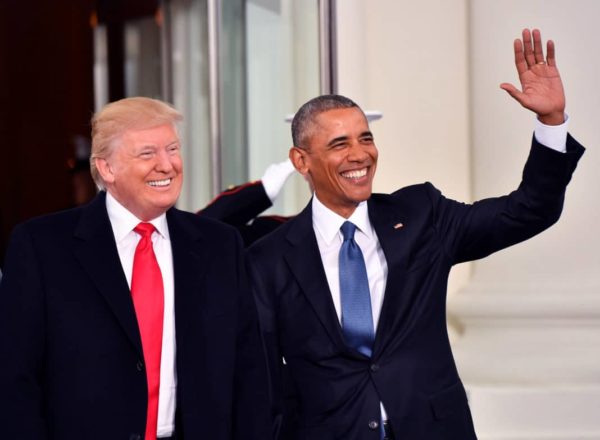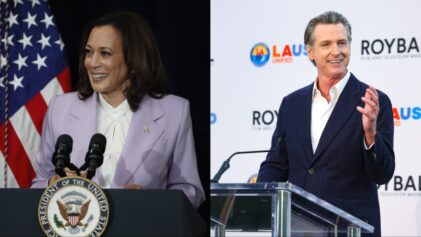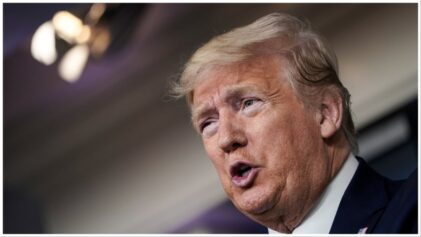As explored during Donald Trump’s troubled first 100 days in office, there’s a new force in the White House, a political whirlwind of sorts determined to sweep away all traces of its previous occupants, or at least their legislation.
Following years of public animosity towards President Obama — including racist birther accusations and calling him the “most ignorant president” in history — Trump has finally taken the reins. Setting the tone for a White House now embroiled in controversy, an ongoing investigation and few actual policies, the Trump administration, lacking any political or military experience in the person of the president, instead has largely relied on unraveling anything even remotely connected to his predecessor.

WASHINGTON, DC – JANUARY 20: President Barak Obama (R) and President-elect Donald Trump smile at the White House before the inauguration on January 20, 2017 in Washington, D.C. Trump becomes the 45th President of the United States. (Photo by Kevin Dietsch-Pool/Getty Images)
Despite previously criticizing Obama’s use of executive orders, just hours after being sworn into office Trump issued one of his own, laying the groundwork for what (he hoped) would result in the repeal of the Affordable Care Act. In yet another blow, they quietly scrapped a rule designed to add mentally ill individuals to a gun registry. Since then the administration has moved full speed ahead, resulting in a number of Obama-era laws and regulations either scrapped or headed that way.
After attempting to undermine health care legislation, the administration moved on to immigration, implementing the first travel ban on January 27 of last year, prompting international outrage. By January 30, acting Attorney General Sally Yates had been fired — the first of many casualties — after she refused to litigate for the controversial ban.
By February the White House had begun chipping away at environmental protections, most notably a provision that prevented coal companies from polluting streams and waterways with mining debris. Later that month, the House would vote to repeal hunting regulations on Alaskan refuges. Brett Hartl, director at the Center for Biological Diversity, criticized the changes as “This isn’t hunting — it’s slaughter. Killing wolves and bears in this cruel, unsportsmanlike fashion is outrageous, especially in national wildlife refuges that belong to all Americans.”
By March internet privacy was also at stake, as the Republican-led Congress passed a bill allowing internet providers to monitor users without obtaining consent, and sell any information gained to marketers. That same month, the White House also found time to repeal a rule that previously forced federal contractors to reveal labor violations.
And that was just the first half of 2017. By the end of the year, Trump had tweeted that transgender military recruits would become banned from serving in the U.S. military, key health care subsidies had been removed, and protections designed to hold colleges and universities more accountable for sexual assault on campus had been gutted. Efforts to provide birth control to those that need it most have also been impacted, thanks to new legislation that allows employers to withhold such coverage if providing it contravenes the employers’ religious beliefs.
Now more than a year into his presidency, Trump has neither learned anything nor worked to improve the quality of life in America in any meaningful way, choosing instead to move forward on efforts to remove diversity requirements in colleges across the country, remilitarizing police departments, and closing more than 1200 civil rights investigations.
Whether someone voted for him — or refused to vote all — the effects of the Trump administration will be felt by most Americans before it’s all said and done. As Tommy Vietor, a former national security council spokesman, told The Guardian, “The whole thing that animates and unites his policy views is antipathy towards Obama.”
Vietor added, “He’s a vindictive person so there is an element of this that is about sticking it to Obama. He knows, probably better than anyone, how to find all the Republican erogenous zones because he spent years whipping people into a frenzy and telling lies about Obama.”
Indeed, Trump’s animus against Obama is so primal, that if the infamous Christopher Steele dossier is to be believed, Trump went so far as to “mark” a certain bed in a Moscow Ritz Carlton suite in 2013 because he learned the Obamas had once slept in the same bed.
The roots of Trump’s Obama grudge might well go back to specific date: April 30, 2011. On that spring day, Trump was still the centerpiece of “The Apprentice” reality TV show and had already become the biggest name in the birther movement. But that evening he attended the White House Correspondents’ Association dinner, where he sat in fuming silence as he was roasted first by Obama and then by comedian Seth Myers. Trump, who is known for his vindictiveness, apparently never got over being the object of derision that night in front of assembled elite Washington reporters and politicians, and, in a break from White House tradition, he has not attended the correspondents dinner as president.
The undoing of Obama’s presidential legacy seems to be Trump’s mission, and if he should succeed it could prove to be the undoing of years of American progress.


